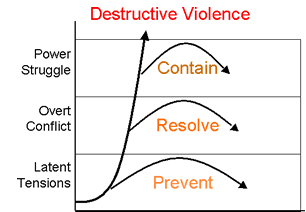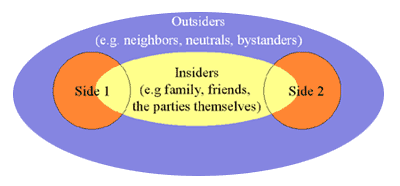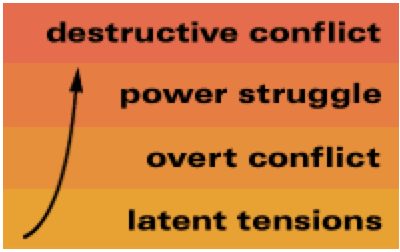The Bridge Builder: Sisterhood Under Fire
By Carole Frampton
Ida lives in Bujumbura, the capital of Burundi. She is the president of a women’s neighborhood association on the outskirts of the city. Until a series of intercommunal massacres in 1993, the association included and supported women from both the Hutu and Tutsi ethnic groups. The women owned some communal land and shared its harvest among themselves. When it became dangerous to live in mixed neighborhoods, the Hutu women fled the Musaga district to settle on the other side of the road, in Busoro. For six years, the association was split. Half the members lived across the road, so close and yet completely cut off from their former community. When Ida heard that the houses of many of the former members of the women’s association had been burnt down, she came to the Search for Common Ground Women’s Peace Center to ask for our help. Ida wanted to organize what we call a “positive solidarity” event.
Her gesture was a very courageous one. Because her own neighborhood had recently been attacked by Hutu rebels, her neighbors saw her solidarity-building efforts as the work of a traitor. By reaching out to the women of Busoro, she was helping the people who were now seen as the “enemy.” But Ida believed that women of both sides were sisters and that bridges had to be built between them.
On the day of the event, Ida, a Tutsi, gathered about 250 Tutsi and Hutu women together at the district administrator’s office in Musaga. Many of those crammed into the small building must have felt what one expressed: “I never believed I would sit in the same room with the mothers, wives, and sisters of those who killed my sons.” A tall, defiant woman and a regular visitor at our Center, Ida stood up to speak but was soon interrupted by the sound of a burst of gunfire, probably from one of the all-too-regular clashes between government troop and armed rebels, who lurked perpetually on the outskirts of the capital city. She went on with her speech, but when the sound of fighting became too loud for her to continue, she started a chant. Soon the whole room was chanting, drowning out the gunfire. “What are they saying?” I asked one of my colleagues, who was staring at the women in disbelief. “They are saying, ‘We want peace now!'”
Then came the exchange of gifts. Ida and her colleagues had pooled their meager resources and collected aid from humanitarian agencies to give to the women whose homes had been destroyed. In the driving rain, they had carried the 100-lb. sacks on their heads to the Women’s Peace Center. That day, the ones who were giving were just as poor and needy as those receiving the bountiful gifts. Speeches and singing followed the gift giving, and soon the women began dancing. This was not the formal dancing common in Burundi. The women danced wildly, without reserve, and embraced one another. As we joined the dancers, a friend turned to me and said, “I’ve never seen anything like this!”
As the celebration reached a fever pitch, the gunfire began anew. The local administrator suddenly looked very worried, warning, “The killers will come – this is too much, this is too loud – they can’t ignore this.” As if everyone had heard him, the dancing stopped. In only a few minutes, the room was empty. But every one of the women left smiling – their message had been sent!
When I think back on my time in Burundi, I’m often worried for the friends I’ve left there. Then I remember Ida and her friends. I know that in the end peace will come because of courageous women like the ones who gathered in the shelter of the Women’s Peace Center that day. Their voices will be heard. These women will open the eyes of their sons, husbands, and politicians to the shared humanity of the people of Burundi.
Carole Frampton is the director of the Common Ground Partnership and a member of Search For Common Ground, an international conflict resolution organization.




